With the increase of online colleges in Michigan, it’s easier than ever to attend a school in the state, even if you don’t live there.

In 2006, Michigan became the first state to require all high school students to participate in an online course or learning experience prior to graduation to ensure they are prepared for postsecondary online learning.
Editorial Listing ShortCode:
This demonstrates the state’s policymakers’ value of education and their willingness to invest in the future of students.
Online Colleges in Michigan

The National Center for Education Statistics (NCES) reports that nearly 24% of college students in Michigan are enrolled exclusively in online courses. Approximately 36% are participating in a hybrid of online and on-campus courses.
Online learning options continue to grow as schools realize the need for flexible education alternatives. Today, nearly every postsecondary school in the state offers online courses or degree programs.
Editorial Listing ShortCode:
Various schools across the state offer dozens of online college programs at the undergraduate, graduate, and certificate levels in popular areas like business administration, nursing, education, and more.
At the community college level, 28 institutions have banded together to form Michigan Colleges Online (MCO). Following a simple enrollment process, MCO allows qualifying students to take courses from any member school and easily transfer the credits back to their home institution.
Common Online Degrees in Michigan

There are a wide variety of online degrees you may choose to pursue in Michigan, but here are some of the more common ones you may find there.
- Business Administration and Management: This degree explores the various aspects of running a company, such as marketing, finance, and operations.
- Computer Science: Earning this degree can help you learn how to optimize and troubleshoot technology, manage data, and program computers.
- Nursing: This degree can give you the opportunity to gain the medical knowledge and skills needed to pursue a career in nursing. Programs in this field often involve lab work.
- Accounting: Programs in this field typically cover fundamentals of accounting, like auditing, analysis, and business law, and can help prepare you to become an accountant.
- Engineering: This degree typically allows students to specialize in a certain area of engineering, such as mechanical engineering.
Additional fields of study that can often be seen in Michigan schools are psychology, finance, and operations. Many of these majors align with some of the more popular jobs in the state.
Overview of Higher Education in Michigan

Michigan is home to 88 degree-granting institutions, according to the NCES. Of those, 46 are public schools, 38 are non-profit private schools and 4 are for-profit private schools. This number includes Michigan community colleges online.
To attend one of the state’s 4 year public institutions, the NCES reports that in-state students pay, on average, $13,716 in tuition and fees each year. Non-residents pay, on average, $39,427. Both price tags are among the highest in the nation.
Editorial Listing ShortCode:
Those in the Midwest may be able to get a break. Michigan is part of a nine-state tuition reciprocity program called the Midwest Student Exchange Program (MSEP).
MSEP allows qualifying students to enroll at public colleges and universities in participating states and pay no more than 150% of the in-state tuition rate. This gives students access to a much greater selection of courses.
Employment Outlook for College Graduates in Michigan

The Bureau of Labor Statistics states that over 4 million people are employed in Michigan. Some of the most employed industries in the state are office and administrative support, production, sales, and related occupations.
The unemployment rate in Michigan is around 4.1%. Mining and logging, leisure and hospitality, and government jobs have all seen recent increases in their workforce.
The number of people employed in Michigan has remained steady over the past six months, which may indicate that job seekers in the state will be able to anticipate job prospects.
Careers & Salaries in Michigan
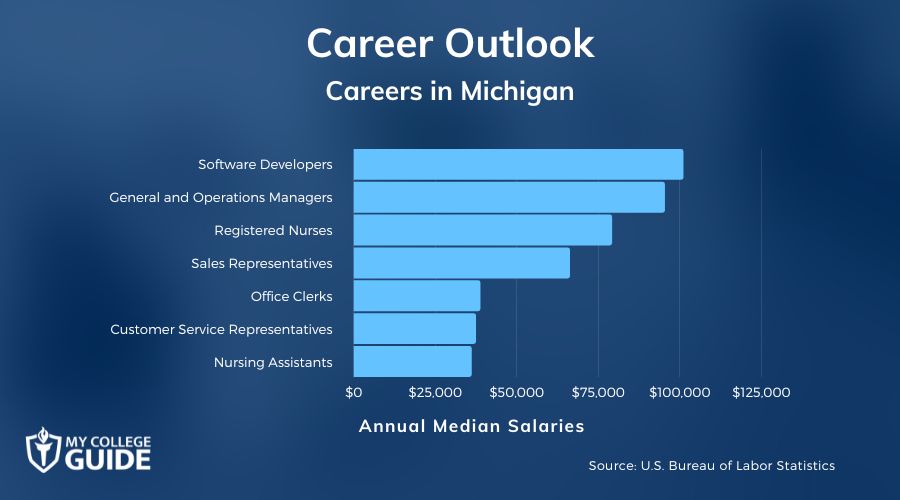
If you’re looking to apply to Michigan online colleges, it may be helpful to get an idea of the most popular careers in the state. Below are examples of some of the more common careers people living in this state work in.
Editorial Listing ShortCode:
Nursing is a thriving field in Michigan, and registered nurses, nursing assistants, and home health and personal care aides are some of the highest-employed jobs in the state. Sales and related occupations are also one of the most common groups of jobs in Michigan.
According to the Bureau of Labor Statistics, below are a few common careers in the state of Michigan.
| Careers | Annual Median Salaries |
| Software Developers | $101,070 |
| General and Operations Managers | $95,390 |
| Registered Nurses | $79,190 |
| Sales Representatives, Wholesale and Manufacturing, Except Technical and Scientific Products | $66,270 |
| Office Clerks | $38,800 |
| Customer Service Representatives | $37,440 |
| Nursing Assistants | $36,130 |
| Retail Salespersons | $29,930 |
| Home Health and Personal Care Aides | $28,560 |
| Fast Food and Counter Workers | $27,040 |
Many people are also employed in corporate roles as software developers, operations managers, and office clerks. Office and administrative support occupations are the most-employed group of jobs in the state.
Michigan Online Universities Admissions Requirements

The admissions requirements for your online bachelor’s degree in Michigan will depend on which program you apply for, but here are a few common ones.
- High school and college transcripts
- SAT or ACT scores (only some schools require them)
- High school diploma or GED
- Specific coursework
Depending on which program and major you choose, your school may require you to have completed high school classes in a relevant subject. Some schools may accept associate’s coursework instead of a high school degree.
MI Online Colleges Accreditation
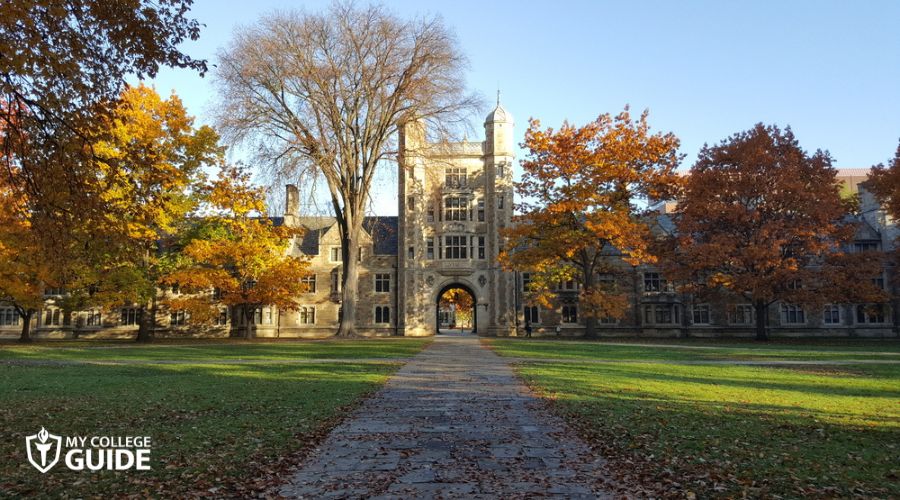
When choosing which school to go to for your online degrees in MI, or in any state, it’s important to take regional accreditation into consideration.
When a school is regionally accredited, a third-party accrediting organization has decided it meets a series of academic quality standards. Post-graduation, employers may want to see that you have attended a regionally accredited school, so it may open up more job prospects.
Editorial Listing ShortCode:
If you are looking into qualifying for federal financial aid, it may be beneficial to attend a regionally accredited school. To learn more about regional accreditation, you can visit the U.S. Department of Education website.
Financial Aid and Scholarships
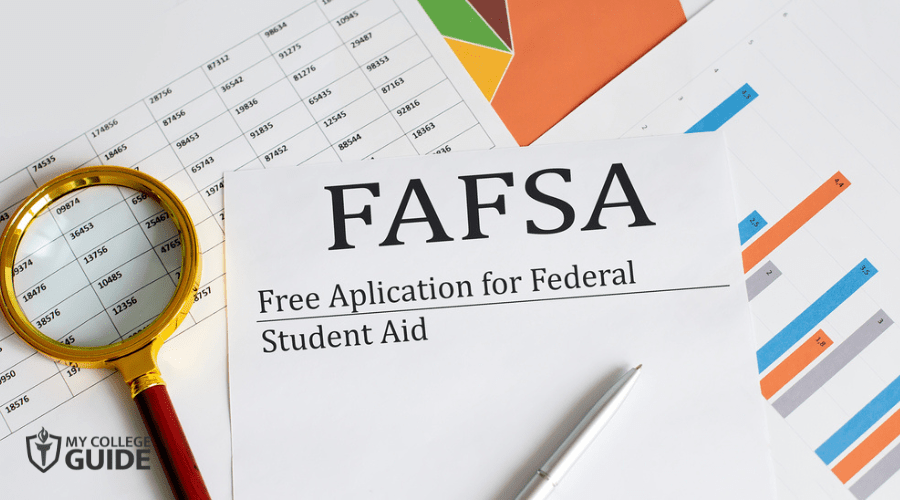
If you’re thinking about pursuing a degree at one of the online Michigan colleges, often one of the first steps is to fill out the Free Application for Federal Student Aid (FAFSA). This will allow you to determine your access to federal, state, and some forms of private financial aid.
The information you provide will be used to determine how much and what kind of financial aid you are offered.
Other types of financial aid include grants and scholarships, which do not have to be repaid as long as they are used appropriately.
In Michigan, the Office of Postsecondary Financial Planning, a department within the Michigan Department of Treasury, oversees a number of grant and scholarship programs for college students, including:
- Michigan Tuition Grant: This need-based grant provides aid up to $2.800. It is available to qualifying undergraduates at independent non-profit colleges and universities.
- Michigan Competitive Scholarship (MCS): This is a need and merit-based scholarship for up to $1,000 a year. Those who have scored at least a 1200 on the SAT may apply.
- Tuition Incentive Program (TIP): This program aims to provide an incentive to complete high school by providing tuition assistance for college. It provides need-based aid. Applicants must meet Medicaid eligibility and apply prior to graduation
- Children of Veterans Tuition Grant: This grant is given to the natural or adopted child of a Michigan veteran who is totally and permanently disabled, missing in action, or deceased. It grants up to $2,800 per year.
- Police and Firefighter’s Survivor Tuition Grant: This grant is offered to a spouse or a natural or adopted child of a police officer or firefighter who was killed in the line of duty. It waives the full tuition for the student it is granted to.
- Fostering Futures Scholarship (FFS): This scholarship is granted to chosen students who have formerly been in foster care. It awards up to $3,000.
While the programs above are state-funded, there are also numerous private scholarships available to the citizens of Michigan.
The Saginaw Community Foundation (SCF) works with individual donors as well as local nonprofits to administer more than 300 charitable funds and 150 scholarships. Students can register accounts and apply for funds via the website.
Here are a few of the scholarships available through the SCF:
- Brandon Walker “BW” Memorial Scholarship
- Bernice Barlow NAACP Scholarship
- Bernie Smillie Memorial Scholarship
- Circle Michigan Scholarship
- Clifford H. Spicer Memorial Scholarship
The amount offered for each of these scholarships varies from year to year.
Most colleges and universities offer their own assistance options as well. You can check with the financial aid office at the school you’re considering to find out what you may qualify for and how to apply.
Michigan Online Education Resources

If you’re looking for more information about college in Michigan, organizations like these may be able to help.
- Michigan Education Savings Program: This program offers investment options, low fees, flexible payment plans, and more to help families pay for education in Michigan.
- Michigan Department of Education: The state education department can provide resources for family engagement, accelerated learning, financial management, and more.
- Michigan Education Trust: This organization aims to help make college more affordable for students and families through a prepaid tuition savings program.
These programs may provide resources or plans to help you save money on your education.
How Much Does It Cost to Go to an Online College in Michigan?

The cost of online universities in Michigan varies, but on average, in-state, 2 year public universities are the most affordable. Out-of-state, public, 4 year colleges are the most expensive on average.
According to the National Center for Education Statistics, the average undergraduate in-state tuition for public 2 year universities is $3,756 a year.
Editorial Listing ShortCode:
The average tuition for out-of-state students at a public 4 year university is $39,427 a year. If you are an in-state student, however, The average tuition for in-state students at a public 4 university is $13,716 a year.
Tuition Breaks for Out-of-State Students

While being an out-of-state student is often more expensive than other options, there are ways you may be able to make earning your degree at a Michigan online school more affordable if you don’t live in Michigan.
The Midwest Student Exchange Program helps make college more affordable for students who live in Indiana, Kansas, Minnesota, and a handful of other states. More than 70 schools in these states charge students reduced out-of-state tuition if they live in participating states.
While Michigan currently doesn’t participate in the Midwest Student Exchange Program, it’s worth looking into tuition break opportunities like these if you are an out-of-state student.
What Jobs Are in High Demand in Michigan?

According to Michigan Labor Market Information, the following occupation groups are some of the most highly employed in Michigan.
- Production
- Office and administrative support
- Transportation and material moving
- Sales and related
- Food preparation and serving related
Transportation and material moving, food preparation, and healthcare practitioners show the highest number of projected new jobs over the next decade. Leisure and hospitality, education, and health services also have high estimates of job growth over the next few years.
What Are the High Paying Jobs in Michigan?
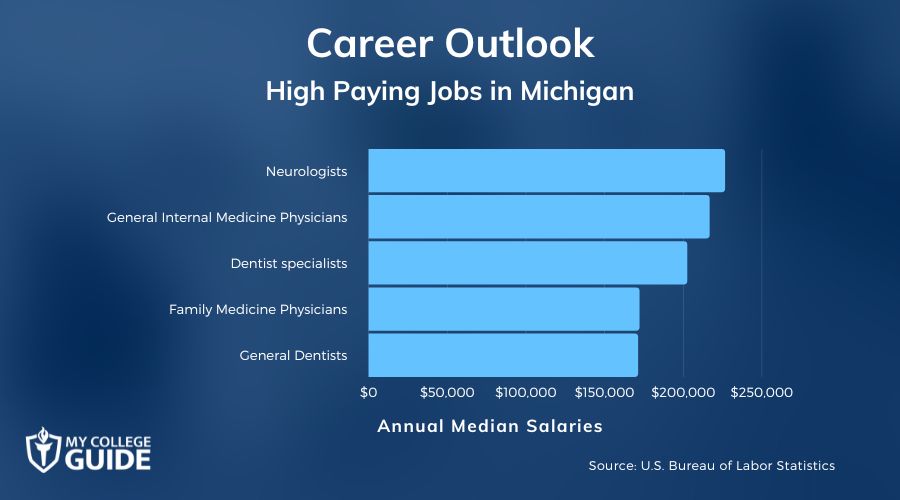
The salary earned in a role depends on a variety of factors, including your education, skillset, experience level, and more. According to the Bureau of Labor Statistics, the highest paying jobs in Michigan are all in the healthcare arena.
Dentist specialists have one of the highest median salaries in the state, making on average $202,430 per year. Neurologists and general internal medicine physicians have even higher average salaries, making $226,470 and $216,650 respectively.
Editorial Listing ShortCode:
General dentists and family medicine physicians are also typically high-paying jobs. They have median annual salaries of $171,180 and $172,080, respectively.
List of Online Colleges in Michigan
Methodology: The following school list is in alphabetical order. To be included, a college or university must be regionally accredited and offer degree programs online or in a hybrid format.

Baker College offers a variety of flexible online degree programs that are designed to allow students to study while working or maintaining other commitments. Classes are 8 weeks long, and though they are online, they still provide opportunities to interact with teachers and classmates.
Areas of study offered include computer science, accounting, psychology, and marketing.
Baker College is accredited by the Higher Learning Commission.

Central Michigan University’s online degree programs are designed to provide challenging coursework and the same academic education students can receive on campus. Online courses are 8, 12, or 16 weeks long.
CMU offers over 20 different degree programs online. Fields of study offered include information systems, political science, applied business communication, and psychology.
Central Michigan University is accredited by the Higher Learning Commission.

Cleary University offers a variety of online degree programs designed to teach practical, business-related skills. Areas of study offered include corporate accounting, public accounting, project management, digital marketing, sports promotion and management, and business management.
There are also degree completion programs for those who already hold associate degrees.
Cleary University is accredited by the Higher Learning Commission.

Cornerstone University offers a variety of online degree programs. Fields of study offered include communication, business administration and leadership, ministry leadership, organizational management, and psychology.
Most of Cornerstone’s online students can work full-time while completing their degrees. Online students have access to resources such as tutoring, tech support, and career coaching.
Cornerstone University is accredited by the Higher Learning Commission.

Davenport University offers online bachelor’s degree programs in operations and supply chain management, computer information systems, data science and analytics, and more. The online courses may be 4, 7, or 15 weeks long, and they may be synchronous or asynchronous.
Davenport University is accredited by the Higher Learning Commission.

Eastern Michigan University offers flexible but academically rigorous online bachelor’s degree programs in dietetics and technology management. The school offers an RN-to-BSN program for nurses as well. On-campus students may also take some courses in online or hybrid formats.
EMU’s online courses are taught by the same instructors who teach on campus.
Eastern Michigan University is accredited by the Higher Learning Commission.

Ferris State University offers online bachelor’s degree programs in business administration, digital media software engineering, health information management, and more. The school aims to provide online students with convenience and flexibility while still providing the same education they could get on campus.
Ferris State’s programs are designed in consultation with industry experts.
Ferris State University is accredited by the Higher Learning Commission.

Grace Bible College is an online school that aims to help non-traditional students prepare for careers in ministry.
All students begin with a 52 lesson course that can be started at any time and completed at the student’s own pace. After completing this, students may progress to an Associate or Bachelor’s in Bible Studies by completing further coursework.
Grace Bible College is accredited by the North Central Association of Colleges and Schools.

Kettering University offers online degree programs in business management, supply chain management, electrical and computer engineering, data science, and more. Classes use an asynchronous format and are designed to teach practical skills in business and STEM fields.
Students at Kettering also have opportunities to participate in internships and co-ops.
Kettering University is accredited by the Higher Learning Commission.

Lawrence Technological University offers online degree programs in construction engineering management, industrial engineering, business administration, architecture, and more.
Most of LTU’s online classes are asynchronous with recorded lectures and no set log-in times, but LTU recommends logging in at least once a day.
Lawrence Technological University is accredited by the Higher Learning Commission.

Madonna University offers online undergraduate degree programs in criminal justice, nursing, general studies, family and consumer science, and more. Coursework is available around the clock, and students may study entirely according to their own schedules.
Madonna University also has a generous transfer credit policy for those who have already taken some college courses.
Madonna University is accredited by the Higher Learning Commission.
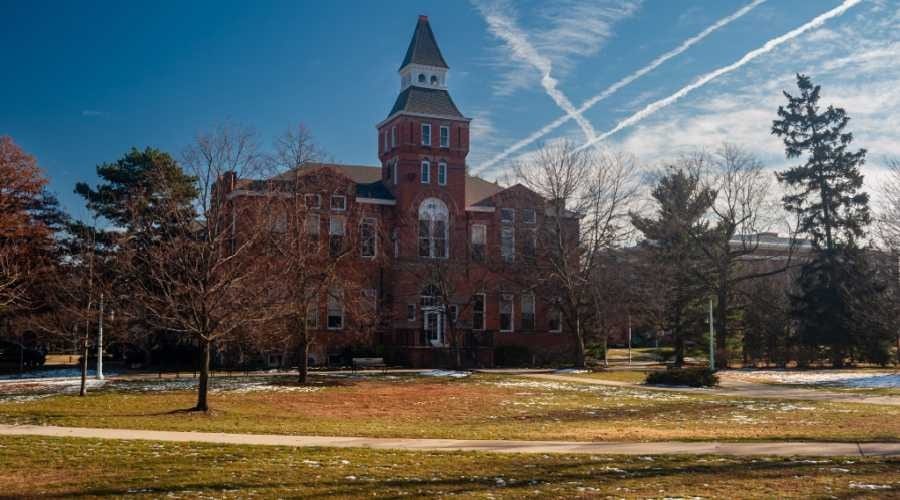
Michigan State University offers online degree programs in fields such as criminal justice, family community services, civil engineering, and more. Most of MSU’s online courses are asynchronous with no set meeting times, but there are exceptions.
More than 90% of MSU’s students find jobs or continue to more advanced degree programs upon graduation.
Michigan State University is accredited by the Higher Learning Commission.

Michigan Technological University’s online programs are designed to allow students to continue their education from anywhere with an internet connection.
They aim to provide the same rigorous education students can receive on campus. They use video conferencing and live streaming technologies to create an engaging, interactive experience. Bachelor’s degrees are available in civil engineering and mechanical engineering.
Michigan Technological University is accredited by the Higher Learning Commission.

Northern Michigan University aims to provide a convenient but academically rigorous education through its online Global Campus. The degree programs are designed for busy adults.
Fields of study offered include management, nursing, applied workplace leadership, loss prevention management, psychology, and criminal justice. Some programs are also available in a blended on-campus and online format.
Northern Michigan University is accredited by the Higher Learning Commission.

Students may earn a degree online at Northwood University without making any visits to campus. Online programs are available in cyber security management, automotive marketing and management, management information systems, accounting, and more.
Northwood’s online courses are designed to allow plenty of interaction with teachers and classmates.
Northwood University is accredited by the Higher Learning Commission.

At Spring Arbor University, online students can major in cybersecurity, human services, social work, and more. Online classes have virtual meetings via Zoom to give students opportunities to ask questions and participate in discussions. The average class size is just 15 students.
Spring Arbor seeks to provide its students with a challenging and Christ-centered education.
Spring Arbor University is accredited by the Higher Learning Commission.
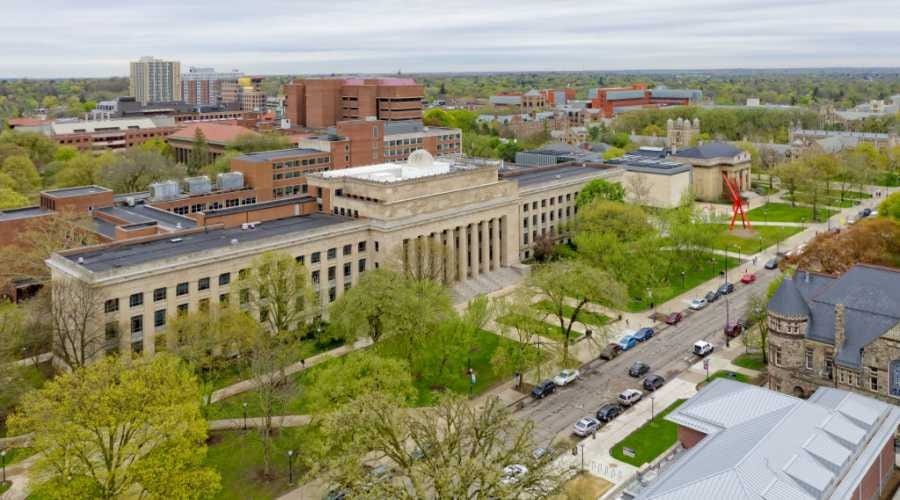
The University of Michigan—Ann Arbor offers online degree programs in fields such as business, data science, and technology. The programs are designed to allow students to complete their studies while maintaining full-time employment.
Online courses vary in length, and degrees may be completed in a hybrid on-campus and online format.
The University of Michigan – Ann Arbor is accredited by the Higher Learning Commission.

The University of Michigan—Dearborn offers over a hundred options for undergraduate majors in fields such as business, computer science, human services, and more. Most of UM Dearborn’s degree programs include online class options for working adults. The school offers engaging professors and small class sizes.
The University of Michigan – Dearborn is accredited by the Higher Learning Commission.

The University of Michigan—Flint offers fully online degree programs that seek to allow students to balance their studies with other commitments and earn their degrees wherever they live.
Possible fields of study include healthcare administration, history, marketing, general business, operations and supply chain management, and more.
The University of Michigan – Flint is accredited by the Higher Learning Commission.
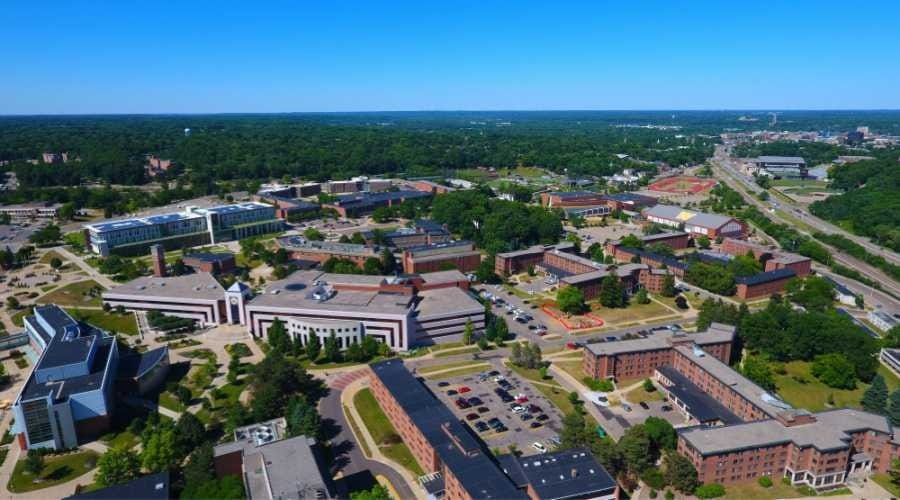
Western Michigan University offers online degree programs in criminal justice studies, strategic communication, psychology, healthcare services and science, and more. These programs are all designed to be flexible and convenient to meet the needs of working adults.
Class sizes are small to help students receive personalized attention.
Western Michigan University is accredited by the Higher Learning Commission.
Getting Your Online Degree in Michigan

The state of Michigan has demonstrated its commitment to higher education. With excellent financial aid programs and plenty of online learning opportunities, they’re driving that point home.
There are many online bachelor degrees in Michigan available for you to pursue. You can start your journey by researching accredited online schools within the state.
You can also view our Online Colleges in Massachusetts and Online Colleges in Minnesota guides for more options.
